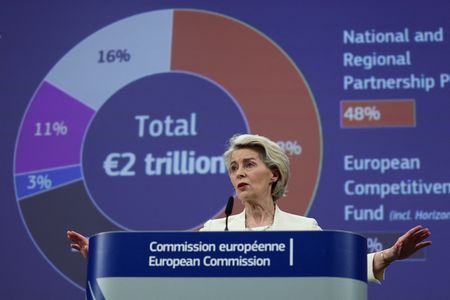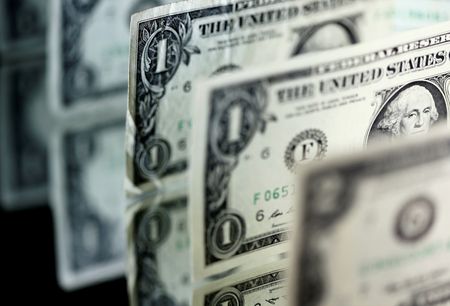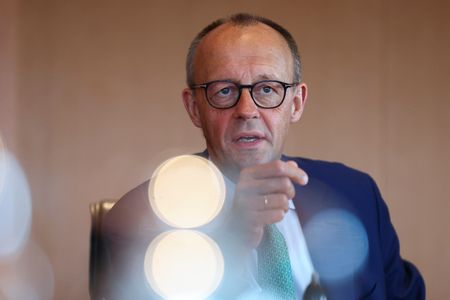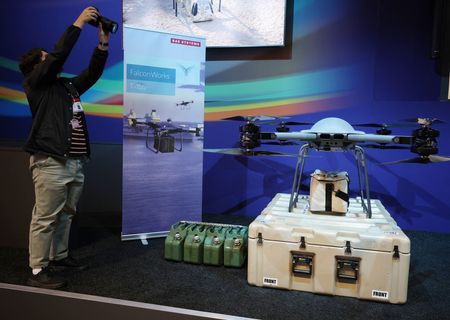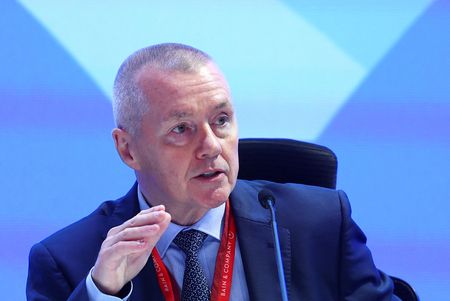By Lili Bayer, Andrew Gray and Kate Abnett
BRUSSELS (Reuters) -The European Commission on Wednesday proposed a 2 trillion euro ($2.31 trillion) EU budget for 2028 to 2034, with a new emphasis on economic competitiveness and defence and plans to overhaul traditional spending on farming and regional development.
“It is a budget that matches Europe’s ambition, that confronts Europe’s challenges and that strengthens our independence,” Commission President Ursula von der Leyen told reporters in Brussels.
“The budget is larger. It is smarter and it is sharper. It delivers for our citizens and our business, our partners and our future.”
The Commission said its proposal amounted to 1.26% of the 27-nation European Union’s Gross National Income – a measure of the size of the economy – compared to 1.13% for the current seven-year budget.
Most of the funding for the budget comes from the governments of the EU’s member countries.
But the Commission proposed several ways to raise more funds directly, including a new tax on companies doing business in Europe that have an annual net turnover exceeding 100 million euros in an EU country.
The proposal marks the start of years of intense negotiations before a final budget is agreed by all member countries and signed off by the European Parliament.
The proposal includes a new 451 billion European Competitiveness Fund focused on boosting Europe’s defence industry, fostering innovation and supporting the transition of industry across the bloc to clean technology.
The proposal allocates 131 billion euros specifically to defence and space – a fivefold increase over the current level, according to the Commission.
Those proposals reflect a desire to boost spending on new priorities after decades in which the vast bulk of the budget went on agriculture and regional development, known as cohesion policy, as it aims to reduce disparities between regions.
But farmers and regions would still receive substantial funding, according to the proposal.
It sets aside 302 billion euros to support farmers and a minimum of 218 billion euros for Europe’s least developed regions, as well as 200 billion euros for global programmes.
The Commission also pitched dedicating 100 billion euros for Ukraine outside of the budget’s structure.
QUICK CRITICISM
Some EU countries and lawmakers were quick to criticise the proposal.
“The EU is important for our prosperity, but the proposed budget is too high,” Dutch Finance Minister Eelco Heinen said.
Hungary’s Prime Minister Viktor Orban said “globalist bureaucrats” were plotting to “drain Europe’s money into Ukraine” while “our farmers are rising up to defend their future”.
“The EU Commission’s budget proposal isn’t just unfair, it’s not even fit to be negotiated,” he said on X.
The European Parliament said the Commission’s proposal was not big enough.
“We cannot do more with less. New priorities need adequate new resources – not cuts to existing priorities,” said Siegfried Muresan, a centre-right member of the European Parliament and a negotiator for the next EU budget.
Budget debates are among the most difficult in EU politics, bringing to the fore political and economic divisions among member countries.
The size of the budget, whether to link funding to political and economic reforms, how to fund EU expenditures and how to repay loans that financed the bloc’s COVID pandemic recovery fund are all likely to be the focus of debate this time around.
Kata Tutto, president of the European Committee of the Regions, said on X that the proposals to simplify funding hid “a MONSTER … to swallow cohesion policy and crack its backbone by nationalising and centralising”.
Farmers held a protest in Brussels, with influential European farmers’ lobby group COPA-COGECA calling the day European agriculture’s “Black Wednesday”.
($1 = 0.8645 euros)
(Reporting by Andrew Gray, Lili Bayer, Geert De Clercq, Foo Yun Chee, Kate Abnett; Editing by Charlotte Van Campenhout, Catherine Evans and Diane Craft)

